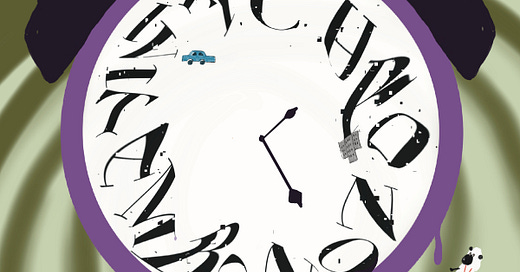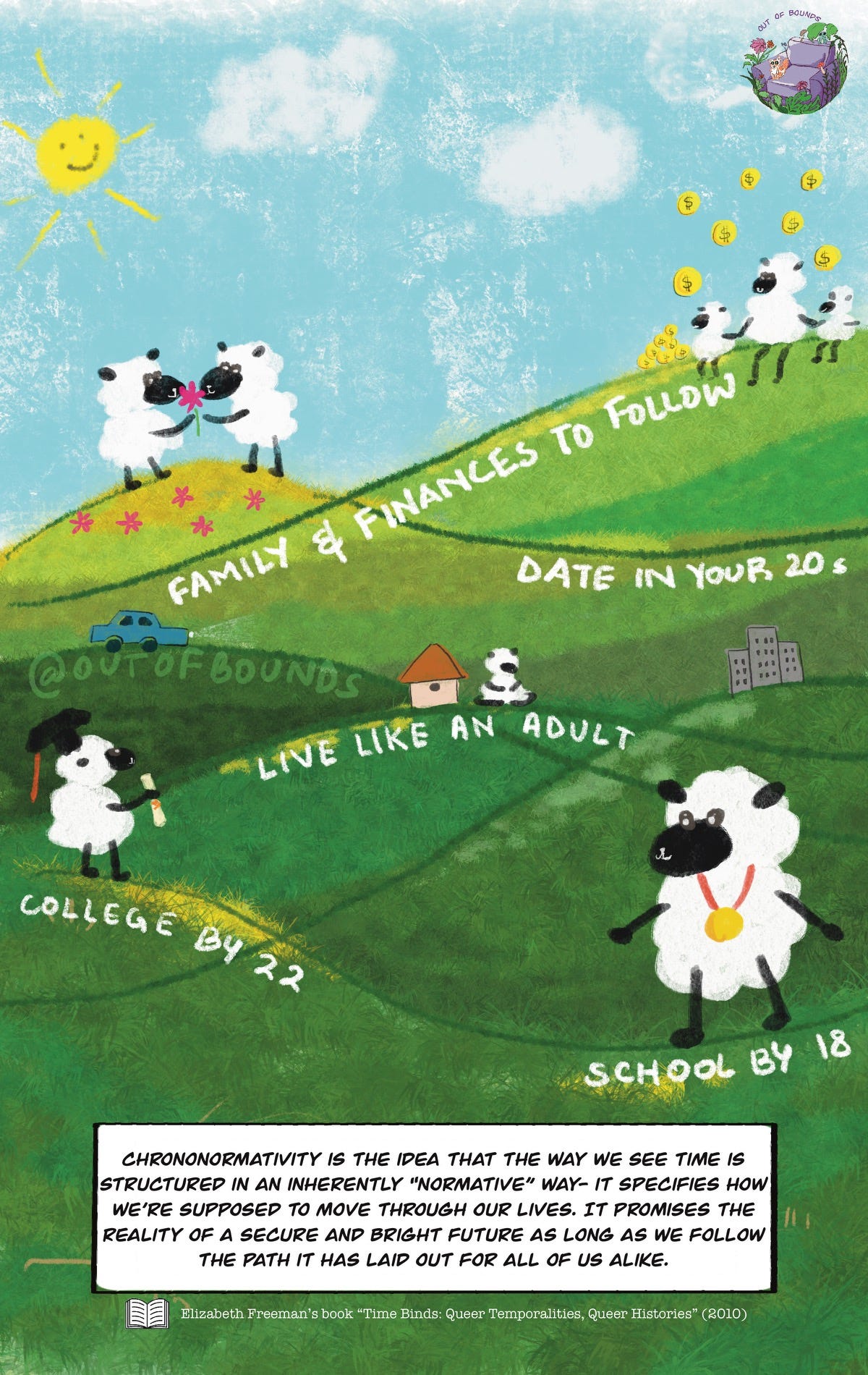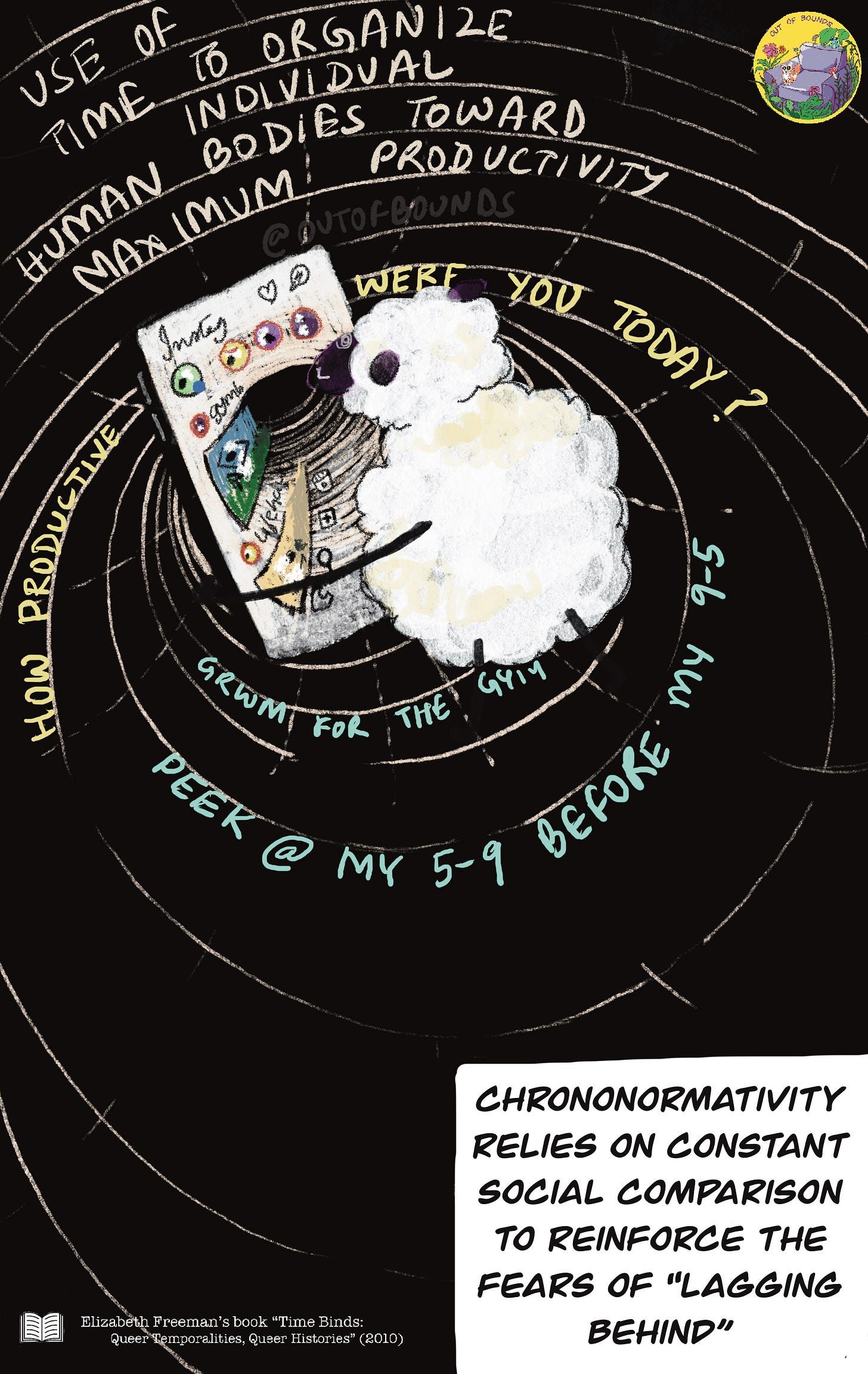Do you ever feel like you’re running behind in life? Like the timeline of school-college-job-partner-marriage-kids doesn’t feel right to you? Like time is slipping away from you and you don’t know what to do?
If you have, then you’re not alone.
Chrononormativity is the idea that the way we see time is structured in an inherently ‘normative’ way - it prescribes or specifies how we’re supposed to move through our lives and our days. It dictates the completion of schooling by age 18, college by 21/22, finding a (heterosexual) partner in your 20s, and eventually ‘settling down’ in a ‘stable’ job and family system by the time you’re in your late 20s/early 30s.
Introducing us to the concepts of ‘success’, our ‘potential’, ‘stability’, ‘consistency’, ‘discipline’ and more, it promises the reality of a secure and bright future - as long as we follow the path it has laid out for us.
And as well-trained sheep would, we all fall in line.
But what happens if you don’t follow the timeline exactly?
If you take a break after college and don’t immediately jump into a job? If you lose your job and don’t know what to do next? If you have dyslexia or ADHD or severe anxiety and need to repeat a grade in school? If you’re disabled and need to take time away from school, college or work in order to survive the day? If you’re queer and can’t marry your partner? If you’re trans and go through a second puberty at 25?
In other words, what happens if you aren’t ‘normal’?
In what ways has chrononormativity made you wonder if your timelines are not normal?
What tools does chrononormativity use to establish these norms and timelines?
One such tool is social media, through which it lays down ‘better’ ways to spend our days. This includes the number of hours we work, what we do before and after, or how ‘productive’ our hobbies are. A good way to look at how chrononormativity has seeped into our day-to-day lives is to watch the many, many “5-9 before/after my 9-5” videos that are all over social media at the moment.
Chrononormativity asks us, if you’re not going to the gym five times a week, cooking yourself a healthy breakfast every morning, and packing your work bag with multiple non-necessary luxury items, are you really making the most of your day? Your life?
As these ideas of productivity and normativity become more and more ingrained in our lives, we also get recruited into surveilling ourselves as well as everyone around us into conforming to these timelines.
These timelines are not built to accommodate anyone who deviates even a little bit from the norm. This could include anything from taking a gap year, to working in an ‘unconventional’ job to marrying late or choosing not to marry. For neurodivergent and queer people especially, these timelines do not acknowledge our individual experiences. They create structures of power that tower over us, watching and waiting for us to slip up.
When we slip up - and we do - we either self-correct in a panic until we’re back on the timeline, or are corrected by people around us. These could be parents, teachers, bosses, colleagues, siblings, or partners. In other words, regular people who are also being impacted by chrononormativity, and are simultaneously acting as the enforcers of it.
We become so occupied in surveilling and policing our own individual lives that we lose sight of the fact that being policed is a collective experience.
[alt text: The image references the structure of a panopticon as referenced in Foucault’s work, i.e. ‘a circular prison with cells arranged around a central well, from which prisoners could at all times be observed.’ The prison cells here are occupied by lines of dazed sheep, and the central well is replaced by sheep in positions of authority, surrounding a mysterious hooded figure representing chrononormativity.]
Why are we so influenced by chrononormativity? What fuels it? What’s the point?
And what happens when we turn the gaze back at chrononormativity to get our answers?
Issue 1 to conclude on 11 November, 2024. Stay tuned for the unmasking of chrononormativity in Part 2.Out of Bounds is a collective aiming to bring psychosocial ideas and musings on mental health outside the therapy room and into our day-to-day discourse. © Isha Misra & Sanjana Mishra, 2024 (All rights reserved).










Love this!! Been thinking a lot about the way we think of time recently.